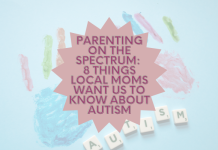Guest Post by Stefanie Jamison
It is my passion to help children to find their voice. For me, this passion is personal. I had a child who was speech delayed due to a traumatic event that he endured at 16 months of age and lost his ability to speak.
In addition to speech therapy, I enrolled my son in a Kindermusik class, because I remembered what I had learned at my time at UC Berkeley about the power of music to help unlock the brain and help children find their voice. And boy, did our lives changed.
He went from being unable to communicate to being able to sing. It was amazing!
After singing, his speech was restored. This same child grew in his love for music through this experience and is now double majoring in piano performance and music composition.
Music changed our family! It helped give my son back his ability to talk.
We wanted to share the gift with others, so we started our own Kindermusik studio – The Musik Box. It’s more than learning an instrument to play. We have all been given an instrument – our voice – and we want to help children learn to use that powerful instrument.
It may be to learn how to communicate, it can be the sharing of ideas, it is about unlocking their imaginations, and it is about discovering the power of their singing voice.
Tips for helping speech at home
- Sing with your child! Encourage your child to sing. Don’t feel like you have a good singing voice? Your child does not care! They think you are a rock star. Studies show that little ones enjoy the sound of their mom’s voice best. And dad’s voice is seen to be soothing and helping children to relax.
- Need help remembering children’s songs? We have an App for that. Download the Kindermusik App for free. We have playlists waiting for you to enjoy.
- Kindermusik is the world-leader in music and movement classes. We are in over 70 countries, so you can experience what the world of music has to offer your child. There are even instruments to explore, crafts to do together at home, and videos so you can see and experience what a class has to offer.
- Go to live musical experiences with your child. Music is shown to wake up the brain for learning. But we don’t just want our kids thinking that music comes out of a box or from a screen. By experiencing it with you (the most important person in your child’s life), your child’s brain releases chemicals that make your child excited about what they just experienced.
- Read to your child. Reading helps them to hear language and a child’s brain starts to unlock the code of how words go together with rhythm and cadence. Explore a wide variety of books. Don’t be afraid to start chapter books with kids as young as 2 years of age. It helps them to activate their imaginations to create the story in their heads. Family favorites to start with: Charlotte’s Web, Stuart Little, Mr. Popper’s Penguins.
- Get down on the floor and play with your child. Make sound effects with the cars. Create dialogue to go with pretend play. As you talk to your child through your play experiences, you are helping them to absorb receptive language – their ability to understand new words. Receptive language comes first and has been happening since the moment your baby was born.
- Use some helpful props at home
- Sock puppets – make different animal sounds. You don’t to purchase anything, but can just use an old tube sock. The ordinary becomes the extraordinary through the imagination of your child.
- Mirror – little ones love to look at themselves in the mirror. You are helping them with self-awareness and developing their receptive language by asking questions like, “Where is your nose?”. Using a mirror captivates their attention to see what they have to do with their faces, mouths, tongues, etc. to activate those key fine motor skills for speech.
- Microphone – it’s amazing to see how littles become rock stars when you hand them a microphone. You can purchase a play microphone (doesn’t even have to be hooked up to anything) as a way for them to discover the power of their voice. A hairbrush or big wooden spoon from the kitchen works as well.
My goal with these props is to show you that you really don’t have to purchase anything. The most important ingredient is YOU!
Parents are the most important teachers of their children. No one will love your child or work harder for them than you will.
So don’t forget that what you provide by playing, singing, reading and engaging with your children is the greatest tool for helping them to find their voice.
If you’re interested in trying music classes with your child, join us for a trial month of classes at our studio! Mention East Valley Moms for $20 off your first month.
For the parents who want more nitty gritty research
We use music as a conduit to help activate the speech center of the brain. Neuroscience research indicates that music optimizes brain development in children. We see that interactive musical learning experiences with parents stimulates language development in young children.
The rhythm and melodic flow of music can help lead children into verbal initiation and trigger speech development. Research demonstrates that the neural band pathway in the brain that links the auditory nerves to the speech center is strengthened through music and singing. Music literally wires the brain for learning! Check out www.musicianbrain.com.












